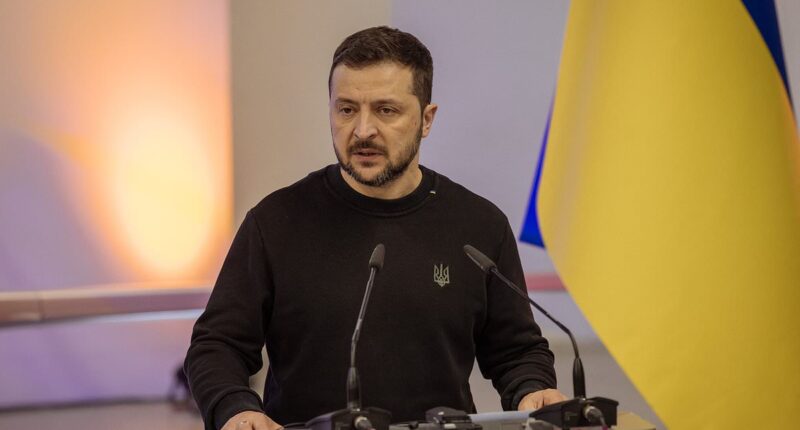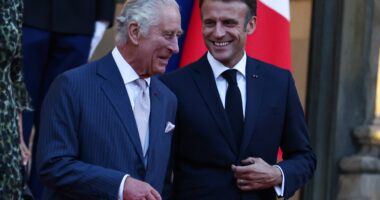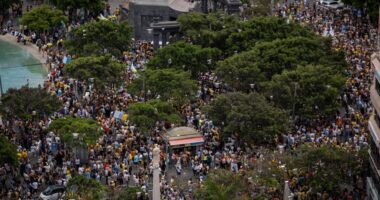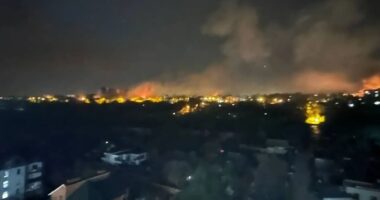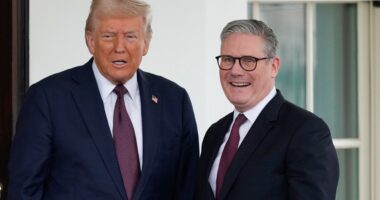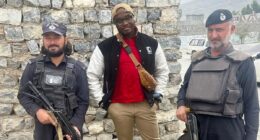Volodymyr Zelensky has hinted he would agree a ceasefire deal to end the Ukraine war if Nato agrees to accept his country as a member.
During an interview with Sky News, the Ukrainian president mentioned his willingness to bring the ‘hot phase’ of the war to an end in return for membership in the bloc.
He proposed that by placing the Ukrainian territory he currently governs “under the NATO umbrella,” he could then negotiate the return of the remaining territory, which is currently occupied by Russia, through diplomatic means.
Zelensky has previously suggested that the war would not end until his country is returned to its internationally recognised borders.
Zelensky emphasized the idea that in order to halt the active conflict, it would be essential to secure the territory of Ukraine under their control within the NATO framework, as he stated in the interview.
‘We need to do it fast. And then on the [occupied] territory of Ukraine, Ukraine can get them back in a diplomatic way.’
The Ukrainian leader was answering questions on what president-elect Donald Trump’s desire to end the war would mean for his country.
It has been reported that one of the Republican’s plans to achieve this would involve Kyiv ceding the land taken by Russia in exchange for Ukraine’s Nato membership.

Volodymyr Zelensky delivers a joint statement with Prime Minister of Denmark following their meeting in Kyiv on November 19

President Zelensky and Trump meet at Trump Tower in New York on September 27

Ukrainian soldiers propell a howitzer towards Russian positions near Chasiv Yar, Donetsk region, Ukraine on November 18
Mr Zelensky’s concessions follow a series of disappointments on the battlefield for Ukraine. Russia has taken six times as much Ukrainian territory in 2024 as it did last year.
And the pace of the Kremlin’s advances has forced Ukraine to send thousands of reservists to reinforce vulnerable areas in the east.
The Kremlin’s so-called ‘meat grinder’ tactics have resulted in Russia’s daily casualty figures breaking 2,000 for the first time, according to figures released on Friday.
Troops are ordered to charge at gunpoint towards Ukrainian defensive positions, leading to territorial gains but increasingly high losses through death, injury and fleeing from the frontline.
Zelensky’s comments also come after an alliance chief assured last month that Ukraine will become a Nato member in the future – but was unable to say when the country might join.
NATO Secretary-General Mark Rutte reiterated on October 17 that the war-torn nation’s place is among NATO’s ranks.
‘Ukraine will be a member of NATO in the future,’ Rutte said. ‘The question is exactly about the ‘when’. I cannot answer that now.’
He said Vladimir Putin must understand that ‘we are in this, if necessary, for the long haul. And obviously we want to be in a place where Zelensky and Ukraine, from a position of strength, is able to start talks with Russia.’
Zelensky has previously insisted that a Nato membership invitation is central to his ‘victory plan’ to end the devastating with Russia.
Earlier this year, he presented this proposal to the Ukrainian parliament which included a refusal to cede territory to Russia as a precursor to coming to the negotiating table.
Meanwhile, German defence giant Rheinmetall and Lithuania on Friday signed deals to begin construction of a $190-million ammunition plant to make artillery shells in the EU and NATO member, which has been nervously eying Russia.
Dubbed by Vilnius the largest defence investment in Lithuania’s history, the plant is seen as a new sign of Europe re-arming to counter security threats from Moscow.
Rheinmetall signed a land lease agreement and supply contract with the Lithuanian government for the procurement of 155mm ammunition.
‘This agreement provides maximum benefit to Lithuania, both in terms of defence and ammunition procurement,’ Lithuanian Economy Minister Ausrine Armonaite told reporters in Vilnius.

Zelensky holds a telephone conversation with the prime minister of Canada, Justin Trudeau

Rheinmetall, Germany’s largest military equipment maker, said it would invest 180 million euros ($190 million) in the plant, which is due to begin operations in mid-2026.
Once completed, it ‘would be able to produce tens of thousands of 155mm calibre artillery shells per year,’ Rheinmetall said in a statement.
The factory will be located near Baisogala, a northern Lithuanian town close to a NATO air base.
President Zelensky and Trump spoke on the phone earlier this month soon after he was re-elected.
The pair reportedly had a constructive exchange during with Zelensky saying the Ukrainian war ‘will end sooner’ following his election.
Speaking on November 17, Zelensky claimed he would like to see the two-and-half year conflict come top end next year through ‘diplomatic means.’
During an interview with Ukrainian radio, he said: ‘For our part, we must do everything we can to ensure that this war ends next year. We have to end it by diplomatic means.
‘And this, I think, is very important.’
‘We have to understand what the Russians want,’ Zelensky said.
Referring to Ukraine, he said: ‘You are at war with a state that does not value its people, that has a lot of equipment, that does not care how many people die.’
Russian President Vladimir Putin has said he will only accept talks with Ukraine if Kyiv surrenders Ukrainian territory that Moscow occupies.
Meanwhile in the Russia-Ukraine war, sources have claimed that Moscow is recruiting hundreds of Yemeni mercenaries to reinforce its lines in Ukraine under the false promise of high salaried work and Russian citizenship.
Recruits say they have already been sent to the frontlines after being inducted into the Russian military with help from a Houthi-linked company.
Many of those heading to Russia claim to have been press-ganged into the military under the promise of a well-paid career away from the frontlines, recruits told the FT.

Vladimir Putin holds a meeting with the Defense Ministry leadership and representatives of the defense industry, in Moscow, Russia on November 22

Ukrainian soldiers work with ‘pion’ artillery in the northern direction of the Donbass frontline in January last year
Yemenis expecting substantial salaries and safe employment in manufacturing roles say they arrived in Russia to be threatened and taken to Ukraine with little training.
Russia has, in recent weeks, looked to avoid full mobilisation by drawing on support from some 12,000 North Korean troops and mercenaries from India and Nepal.
The recruitment of Yemeni soldiers ‘appears to have begun as early as July’, the FT reports, months before Kim Jong Un sent his forces to buttress Putin’s lines.
One recruit estimated that he was part of one group of some 200 Yemenis conscripted to fight in Russia in September.
Some say they were tricked into joining after signing enlistment contracts they could not read, and were told they would be working in lucrative fields like engineering.
